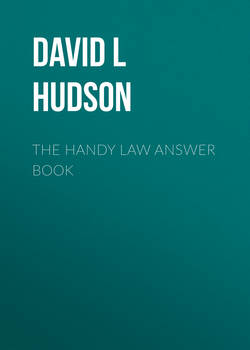Читать книгу The Handy Law Answer Book - David L Hudson - Страница 107
На сайте Литреса книга снята с продажи.
What level of First Amendment rights do students possess?
ОглавлениеPublic school students possess First Amendment rights but they are limited by the school environment. Generally, public school officials can restrict student speech that they reasonably forecast would cause a substantial disruption or material interference with school activities. This is known as the Tinker standard from the U.S. Supreme Court decision in Tinker v. Des Moines Independent Community School District (1969; see LegalSpeak, p. 56).
In later decisions, the U.S. Supreme Court explained in Bethel School District v. Fraser (1986) that school officials can restrict student speech that is vulgar or lewd. The Court later ruled in Hazelwood School District v. Kuhlmeier (1988) that school officials have greater ability to restrict student speech that is school-sponsored, such as expression from most school newspapers, school plays and school mascots. More recently, the Court ruled in Morse v. Frederick (2007) that public school officials can restrict student speech that they reasonably believe advocates illegal drug use.
LegalSpeak: Garcetti v. Ceballos (2006)
Justice Anthony Kennedy (majority): “The controlling factor in Ceballos’ case is that his expressions were made pursuant to his duties as a calendar deputy. See Brief for Respondent 4 (“Ceballos does not dispute that he prepared the memorandum ‘pursuant to his duties as a prosecutor’”). That consideration—the fact that Ceballos spoke as a prosecutor fulfilling a responsibility to advise his supervisor about how best to proceed with a pending case—distinguishes Ceballos’ case from those in which the First Amendment provides protection against discipline. We hold that when public employees make statements pursuant to their official duties, the employees are not speaking as citizens for First Amendment purposes, and the Constitution does not insulate their communications from employer discipline.”
Justice John Paul Stevens (dissenting): “public employees are still citizens while they are in the office. The notion that there is a categorical difference between speaking as a citizen and speaking in the course of one’s employment is quite wrong…. Moreover, it seems perverse to fashion a new rule that provides employees with an incentive to voice their concerns publicly before talking frankly to their superiors.”
Justice David Souter (dissenting): “I agree with the majority that a government employer has substantial interests in effectuating its chosen policy and objectives, and in demanding competence, honesty, and judgment from employees who speak for it in doing their work. But I would hold that private and public interests in addressing official wrongdoing and threats to health and safety can outweigh the government’s stake in the efficient implementation of policy, and when they do public employees who speak on these matters in the course of their duties should be eligible to claim First Amendment protection.”
Justice Stephen Breyer (dissenting): “Where professional and special constitutional obligations are both present, the need to protect the employee’s speech is augmented, the need for broad government authority to control that speech is likely diminished, and administrable standards are quite likely available. Hence, I would find that the Constitution mandates special protection of employee speech in such circumstances. Thus I would apply the Pickering (see p. 53) balancing test here.”
